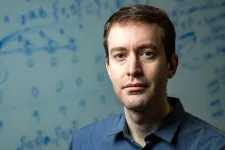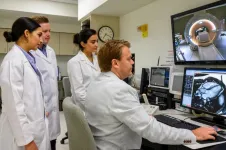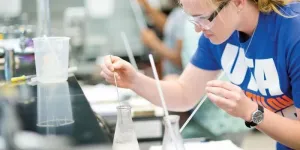(Press-News.org) More and more public services — such as affordable housing, public school matching and child welfare — are relying on algorithms to make decisions and allocate resources. So far, much of the work that has gone into designing these systems has focused on workers’ experiences using them or communities’ perceptions of them.
But what about the actual impact of these programs have on people, especially when the decisions the systems make lead to denial of services? Can you design algorithms to help people make sense of and contest decisions that significantly impact them?
Naveena Karusala, a postdoctoral fellow at the Harvard John A. Paulson School of Engineering and Applied Science (SEAS), with Krzysztof Gajos, the Gordon McKay Professor of Computer Science at SEAS and a team of researchers, are re-thinking how to design algorithms for public services.
“Instead of only centering the worker or institution that is using the tool to make a decision, can we center the person who is affected by that decision in order to work towards more caring institutions and processes,” asked Karusala.
In a paper being presented this week at the Association of Computing Machinery’s conference on Human Factors in Computing System, Karusala and her colleagues offer recommendations to improve the design of algorithmic decision-making tools to make it easier for people impacted by those decisions to navigate all the steps in the process, especially when they are denied.
The researchers aimed to learn from areas where algorithms currently aren’t being used but could be deployed in the future. They looked specifically at public services for land ownership in rural South India and affordable housing in the urban Northeast United States and contestation processes after applicants are denied services.
Governments in the U.S. and India — as well as around the world — recognize the right to contest a denial of public services, and increasingly so when denied by an algorithm. But contestation processes can be complex, time consuming and difficult to navigate, especially for people in marginalized communities.
Intermediaries like social workers, lawyers and NGOs play an important role in helping people navigate these processes and understand their rights and options. In public health, this concept is known as ‘accompaniment,’ where community-based aid workers assist people in under-resourced communities to navigate complex healthcare systems together.
“One of the takeaways of our research is the clear importance of intermediaries and embedding the idea of accompaniment into the algorithm design,” said Karusala. “Not only should these intermediaries be involved in the design process, but they should also be made aware of how the decision-making process works because they’re the ones that bridge communities and public services.”
The researchers suggest that algorithmic decision-making systems should be designed to proactively connect applicants to those intermediaries.
Today, many AI researchers are focused on improving an algorithm’s ability to explain its decision but that isn’t useful enough to the people who have been denied service, said Karusala.
“Our findings point to the fact that rather than focusing only on explanations, there should be a focus on other aspects of algorithm design that can prevent denials in the first place,” said Karusala.
For example, if a background check turns up information that puts a person on the boundary between approval and disapproval for housing, algorithms need to be able to ask for additional information to either make a decision or ask a human reviewer to step in.
“These are some concrete ways that the burden often placed on marginalized communities could be shared with not only intermediaries, but also public service administrators and algorithmic tools,” said Karusala.
“This research is particularly significant because it challenges an assumption held deeply in the computing community that the most effective way to provide people with grievance redressal mechanisms is for algorithms to provide explanations of their decisions,” said Gajos. “Instead, this research suggests that algorithms could be used throughout the process: from identifying individuals who may not apply on their own and may need to be encouraged to do so, to helping applicants prepare and contextualize information to make applications relevant and informative, to navigating contestation strategies.”
The research was co-authored by Sohini Upadhyay, Rajesh Veeraraghavan and Gajos.
END
AI for more caring institutions
Improving AI-based decision-making tools for public services
2024-05-14
ELSE PRESS RELEASES FROM THIS DATE:
Astronomers spot a giant planet that is as light as cotton candy
2024-05-14
Astronomers at MIT, the University of Liège in Belgium, and elsewhere have discovered a huge, fluffy oddball of a planet orbiting a distant star in our Milky Way galaxy. The discovery, reported today in the journal Nature Astronomy, is a promising key to the mystery of how such giant, super-light planets form.
The new planet, named WASP-193b, appears to dwarf Jupiter in size, yet it is a fraction of its density. The scientists found that the gas giant is 50 percent bigger than Jupiter, and about a tenth as dense — an extremely low density, comparable to that of cotton candy.
WASP-193b is the second lightest planet discovered to date, ...
Sleep experts to convene in Houston for SLEEP 2024 annual meeting
2024-05-14
DARIEN, IL – Leading sleep and circadian scientists, sleep clinicians, and industry innovators will gather June 2-5 in Houston at SLEEP 2024, the 38th annual meeting of the Associated Professional Sleep Societies, LLC. Thousands of sleep professionals will connect, explore, and grow at the world’s premier clinical and scientific sleep meeting, held jointly by the American Academy of Sleep Medicine and the Sleep Research Society.
“Every year, SLEEP brings together the world’s ...
Rice’s Mamouras wins NSF CAREER Award
2024-05-14
HOUSTON – (May 14, 2024) – As the Internet of Things (IoT) grows larger and more complex, it becomes increasingly difficult to develop applications.
“A common approach to this problem is to move data from the sensing devices to a central location, such as the cloud, for processing,” said Konstantinos Mamouras, assistant professor of computer science at Rice University. “But this centralized approach underutilizes the small IoT devices at the edge of the network and can overwhelm it due to the large movement of data.”
With his five-year, $547,555 National Science Foundation CAREER Award, Mamouras aims to decentralize the IoT, relieve network congestion and ...
ISS National Lab announces up to $750,000 in funding for technology development in low Earth orbit
2024-05-14
KENNEDY SPACE CENTER (FL), May 14, 2024 – The International Space Station (ISS) National Laboratory is soliciting flight concepts for technology development that would utilize the space-based environment of the orbiting laboratory. This solicitation, “Technology Development and Applied Research Leveraging the ISS National Lab,” is open to a broad range of technology areas, including chemical and material synthesis in space, translational medicine, in-space edge computing, and ISAM (in-space servicing, assembly, and manufacturing). ...
Counterfeit coins can be detected more easily thanks to a novel approach developed at Concordia
2024-05-14
Metal coins may be just about the oldest medium of exchange still in use today, but ensuring their worth requires some of the most state-of-the-art technology available. Counterfeit coins remain a threat to global currencies, with malicious actors flooding markets with fakes. European police broke up a Spain-based criminal ring in late April, demonstrating the issue’s ongoing urgency.
However, no counterfeit is completely detection-proof, no matter how genuine it appears. There are always some tell-tale signals of forgery, even if they are not ...
Professors elected to Academy of Distinguished Scholars
2024-05-14
The University of Texas at Arlington has elected two longtime professors to the Academy of Distinguished Scholars, considered the University’s most prestigious research and scholarship honor.
Ramon Lopez, professor of physics, and Michael D. Nelson, associate professor of kinesiology, are being recognized for their sustained and significant contributions to research and creativity.
“Members of the Academy of Distinguished Scholars exemplify UTA’s commitment to quality research and creative activity,” said Kate C. Miller, vice president of research and innovation. “Mike and Ramon have both ...
UTA biology students receive awards for excellence
2024-05-14
Thirteen undergraduate and graduate students at The University of Texas at Arlington are being honored for excellence in academics, research, mentoring and/or teaching with awards. The awards are a mix of direct applications from students and others where they were nominated by faculty advisors. A committee of biology faculty then voted on the competitive awards.c
“It’s so rewarding to be able to honor the next generation of biologists,” said Melissa Walsh, who chaired the selection committee ...
Making every hair appointment a sound experience #ASA186
2024-05-14
OTTAWA, Ontario, May 14, 2024 – Walking out of a hair salon can have customers feeling brand new, but the noisy environment may have negative effects at the cost of a new “do.” At Image Creators salon in Maryland, owner Silvia Campana along with her employees and customers noticed they had to work hard to understand each other’s words while in the salon, but they couldn’t put their finger on exactly why. In addition to difficulties understanding speech, Campana experienced increased ear pain and tinnitus after long-term exposure to ...
Tennessee teen uses national platform to advocate for CPR and heart health
2024-05-14
DALLAS, May 13, 2024 — The American Heart Association’s National Teen of Impact title offers Gen Z changemakers an influential platform to fight against heart disease to improve health and well-being in communities across the country. This year, Aniston Barnette, a 16-year-old volunteer advocate from Bristol, Tenn., is the 2024 national winner. As a prominent student-athlete, Barnette is supporting the lifesaving mission of the American Heart Association – celebrating one hundred years of lifesaving service – by promoting cardiopulmonary resuscitation (CPR) awareness and education.
After watching family members suffer and die from ...
Study explores role of epigenetics, environment in differing Alzheimer’s risk between Black and white communities
2024-05-14
A study from North Carolina State University has found that environmentally caused alterations to specific areas of the genome – known as imprint control regions – during early development may contribute to the risk of developing Alzheimer’s disease, and that Black people may be more affected than white people. The work adds to our understanding of the ways in which environmental factors can contribute to genetic alterations and disease susceptibility.
“In terms of genetics and disease, ...
LAST 30 PRESS RELEASES:
Yale study challenges notion that aging means decline, finds many older adults improve over time
Korean researchers enable early detection of brain disorders with a single drop of saliva!
Swipe right, but safer
Duke-NUS scientists identify more effective way to detect poultry viruses in live markets
Low-intensity treadmill exercise preconditioning mitigates post-stroke injury in mouse models
How moss helped solve a grave-robbing mystery
How much sleep do teens get? Six-seven hours.
Patients regain weight rapidly after stopping weight loss drugs – but still keep off a quarter of weight lost
GLP-1 diabetes drugs linked to reduced risk of addiction and substance-related death
Councils face industry legal threats for campaigns warning against wood burning stoves
GLP-1 medications get at the heart of addiction: study
Global trauma study highlights shared learning as interest in whole blood resurges
Almost a third of Gen Z men agree a wife should obey her husband
Trapping light on thermal photodetectors shatters speed records
New review highlights the future of tubular solid oxide fuel cells for clean energy systems
Pig farm ammonia pollution may indirectly accelerate climate warming, new study finds
Modified biochar helps compost retain nitrogen and build richer soil organic matter
First gene regulation clinical trials for epilepsy show promising results
Life-changing drug identified for children with rare epilepsy
Husker researchers collaborate to explore fear of spiders
Mayo Clinic researchers discover hidden brain map that may improve epilepsy care
NYCST announces Round 2 Awards for space technology projects
How the Dobbs decision and abortion restrictions changed where medical students apply to residency programs
Microwave frying can help lower oil content for healthier French fries
In MS, wearable sensors may help identify people at risk of worsening disability
Study: Football associated with nearly one in five brain injuries in youth sports
Machine-learning immune-system analysis study may hold clues to personalized medicine
A promising potential therapeutic strategy for Rett syndrome
How time changes impact public sentiment in the U.S.
Analysis of charred food in pot reveals that prehistoric Europeans had surprisingly complex cuisines
[Press-News.org] AI for more caring institutionsImproving AI-based decision-making tools for public services




